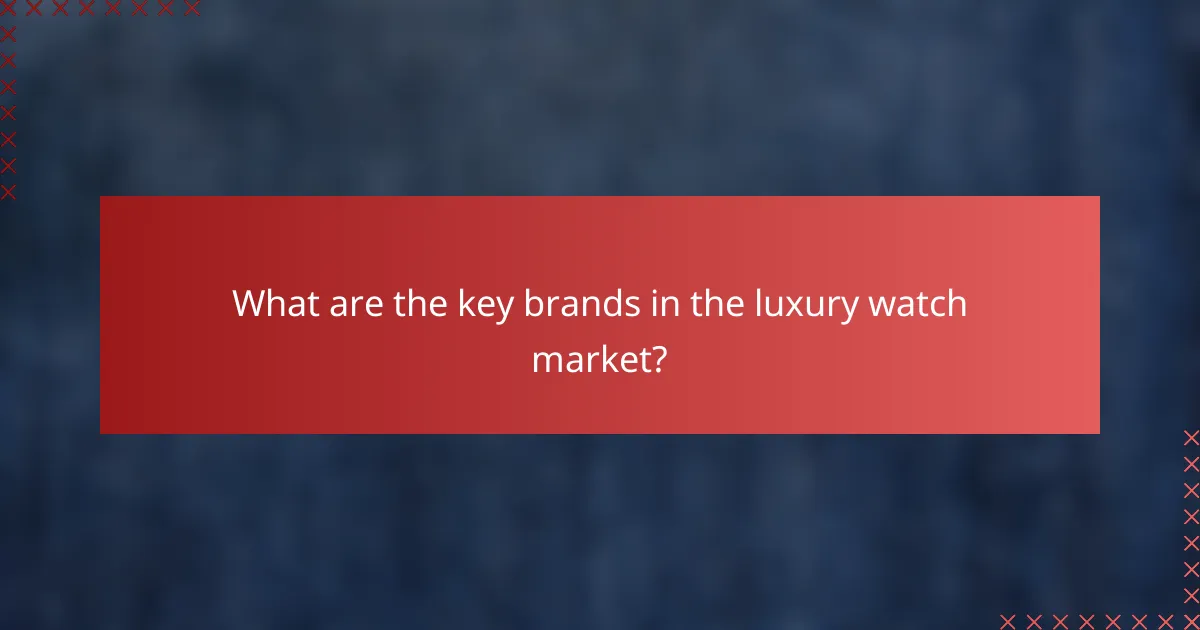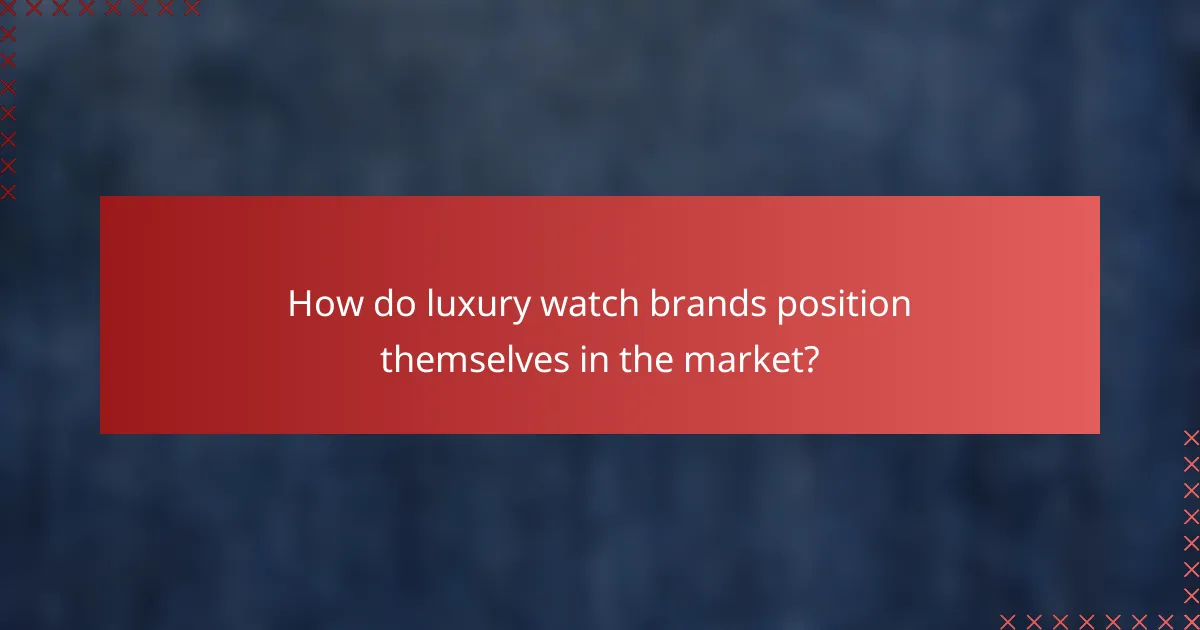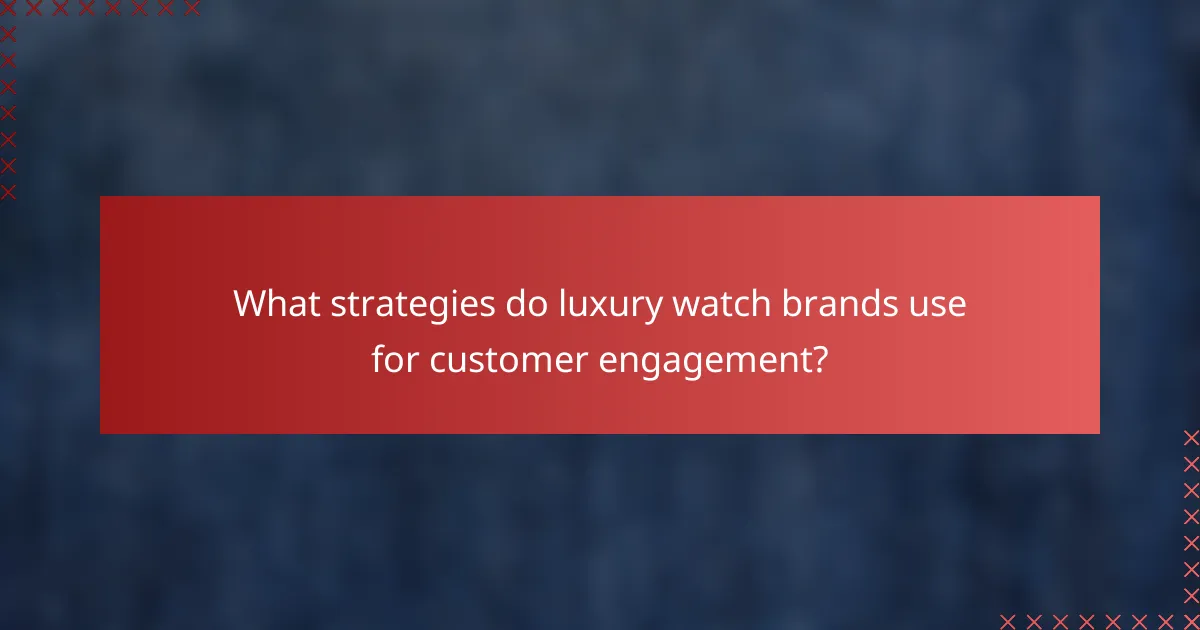The luxury watch market is characterized by a select group of prestigious brands, such as Rolex, Omega, and Patek Philippe, each renowned for their exceptional craftsmanship and rich heritage. To differentiate themselves, these brands employ targeted marketing strategies that highlight their unique identities and create emotional connections with affluent consumers. By focusing on personalized experiences and exclusive collaborations, luxury watch brands not only enhance brand loyalty but also drive sales in a competitive landscape.

What are the key brands in the luxury watch market?
The luxury watch market is dominated by several key brands known for their craftsmanship, heritage, and prestige. Rolex, Omega, Tag Heuer, Patek Philippe, and Audemars Piguet are among the most recognized names, each offering unique characteristics and positioning within the luxury segment.
Rolex
Rolex is synonymous with luxury and precision, often regarded as the benchmark for high-end watches. Known for their iconic designs and robust performance, Rolex watches are highly sought after and often retain or appreciate in value over time.
Key models include the Submariner and the Daytona, which are celebrated for their craftsmanship and status. Rolex’s marketing strategy focuses on exclusivity and a strong brand image, making it a top choice for collectors and enthusiasts alike.
Omega
Omega is recognized for its innovative technology and historical significance, particularly its association with space exploration and the Olympics. The Speedmaster, famously worn during the Apollo missions, exemplifies the brand’s commitment to precision and adventure.
Omega positions itself as a luxury brand that balances tradition with modernity, appealing to a diverse audience. Their watches often feature advanced materials and movements, making them both stylish and functional.
Tag Heuer
Tag Heuer is known for its sporty designs and strong ties to motorsports, appealing to a younger demographic. The brand emphasizes performance and precision, often featuring chronographs and innovative designs that cater to active lifestyles.
Popular models like the Carrera and Monaco highlight Tag Heuer’s commitment to quality and style. The brand’s marketing strategy often includes partnerships with athletes and events, reinforcing its dynamic image in the luxury watch market.
Patek Philippe
Patek Philippe is revered for its exceptional craftsmanship and exclusivity, often considered the pinnacle of luxury watchmaking. The brand focuses on traditional techniques and intricate complications, making its timepieces highly coveted among collectors.
Models like the Nautilus and Calatrava are not only functional but also serve as status symbols. Patek Philippe’s marketing emphasizes heritage and artistry, appealing to those who value tradition and investment in their luxury purchases.
Audemars Piguet
Audemars Piguet is best known for its Royal Oak model, which revolutionized luxury sports watches with its distinctive octagonal bezel. The brand combines avant-garde design with high-quality craftsmanship, attracting a fashion-forward clientele.
Their focus on limited editions and unique designs enhances the brand’s exclusivity. Audemars Piguet’s marketing strategy often highlights innovation and artistic collaboration, positioning it as a leader in contemporary luxury watch design.

How do luxury watch brands position themselves in the market?
Luxury watch brands position themselves by emphasizing their unique heritage, exceptional craftsmanship, exclusive collaborations, and targeted marketing strategies. These elements create a distinct identity that appeals to affluent consumers seeking prestige and quality.
Brand heritage
Brand heritage plays a crucial role in the positioning of luxury watch brands. Companies often highlight their long-standing history, craftsmanship traditions, and iconic models to establish credibility and desirability. For instance, brands like Rolex and Patek Philippe leverage their rich legacies to attract collectors and enthusiasts.
By showcasing their origins and milestones, these brands create a narrative that resonates with consumers, reinforcing the perception of luxury and exclusivity. This storytelling approach helps differentiate them in a crowded market.
Quality craftsmanship
Quality craftsmanship is a cornerstone of luxury watch positioning. Brands invest in skilled artisans and high-quality materials to ensure their timepieces meet rigorous standards. This commitment to excellence is often reflected in the meticulous attention to detail and innovative technologies used in production.
For example, brands like Audemars Piguet and Jaeger-LeCoultre are known for their intricate movements and precision engineering, which not only enhance performance but also elevate the perceived value of their watches. Consumers are willing to pay a premium for watches that embody superior craftsmanship.
Exclusive collaborations
Exclusive collaborations with renowned designers, celebrities, or luxury brands can significantly enhance a luxury watch brand’s market positioning. These partnerships create limited-edition pieces that generate buzz and attract attention from both collectors and fashion enthusiasts.
For instance, collaborations between watch brands and high-fashion labels often result in unique designs that blend style with functionality, appealing to a broader audience. Such exclusivity can drive demand and elevate the brand’s status in the luxury market.
Targeted marketing strategies
Targeted marketing strategies are essential for luxury watch brands to effectively reach their affluent clientele. Brands often utilize high-end advertising channels, such as luxury magazines and exclusive events, to showcase their products to the right audience.
Additionally, leveraging social media platforms with influencer partnerships allows brands to engage with younger, affluent consumers. Tailoring marketing messages to highlight exclusivity, craftsmanship, and heritage can resonate more deeply with potential buyers, enhancing brand loyalty and driving sales.

What strategies do luxury watch brands use for customer engagement?
Luxury watch brands employ various strategies for customer engagement, focusing on personalized experiences, digital outreach, and exclusive events. These methods create a strong emotional connection with consumers, enhancing brand loyalty and driving sales.
Personalized shopping experiences
Luxury watch brands often provide personalized shopping experiences to cater to individual customer preferences. This can include tailored recommendations based on previous purchases or preferences, as well as private consultations with sales associates. Offering customization options, such as engraving or bespoke designs, can further enhance the shopping experience.
Brands may also utilize data analytics to track customer behavior and preferences, allowing them to create targeted marketing campaigns that resonate with specific segments. This approach not only improves customer satisfaction but also increases the likelihood of repeat purchases.
Social media campaigns
Social media campaigns are crucial for luxury watch brands to engage with a wider audience and build brand awareness. Platforms like Instagram and Facebook allow brands to showcase their products through high-quality visuals and storytelling, creating an aspirational lifestyle around their watches. Engaging content, such as behind-the-scenes footage or customer testimonials, can foster a sense of community among followers.
Brands often run targeted ads on social media to reach potential customers based on their interests and demographics. This strategy can significantly increase visibility and drive traffic to their websites or physical stores.
Influencer partnerships
Collaborating with influencers is a popular strategy for luxury watch brands to tap into new audiences. Influencers with a strong following in the luxury or fashion sectors can authentically promote watches, showcasing them in lifestyle contexts that resonate with their followers. This can lead to increased brand credibility and visibility.
When selecting influencers, brands should consider alignment with their values and target market. Effective partnerships often involve long-term relationships rather than one-off promotions, allowing for deeper storytelling and engagement.
Luxury events and exhibitions
Hosting luxury events and participating in exhibitions are effective ways for watch brands to engage directly with customers. These events provide opportunities for potential buyers to experience the brand firsthand, often featuring exclusive previews of new collections. Such gatherings can create memorable experiences that strengthen customer loyalty.
Brands may also leverage partnerships with prestigious events, such as art fairs or fashion weeks, to enhance their visibility. Attending or sponsoring these events can position a brand as a leader in the luxury market, appealing to affluent consumers looking for exclusivity and prestige.

How do consumer perceptions influence luxury watch purchases?
Consumer perceptions significantly impact luxury watch purchases by shaping brand desirability and influencing buyer decisions. Factors such as brand reputation, social status associations, and peer recommendations play crucial roles in how consumers view and ultimately choose luxury timepieces.
Brand reputation
Brand reputation is a critical element in the luxury watch market, as it reflects the quality, heritage, and craftsmanship associated with a brand. Consumers often gravitate towards brands with a long-standing history of excellence, such as Rolex or Patek Philippe, as these names evoke trust and prestige.
When considering a luxury watch, potential buyers should research brand history and customer reviews. A strong reputation can justify higher price points and enhance perceived value, making it essential for brands to maintain their image through consistent quality and marketing efforts.
Social status association
Luxury watches are often seen as symbols of social status, influencing consumer perceptions and purchase decisions. Owning a high-end watch can signal wealth and success, leading consumers to choose brands that are recognized for their exclusivity and prestige.
When selecting a luxury watch, buyers should consider how the brand aligns with their personal image and social aspirations. Brands like Audemars Piguet or Richard Mille are often associated with elite circles, making them desirable for those looking to enhance their social standing.
Peer recommendations
Peer recommendations play a significant role in shaping consumer perceptions of luxury watches. Many buyers rely on the opinions of friends, family, or influencers when making purchasing decisions, as these recommendations can provide valuable insights into quality and desirability.
To leverage peer influence, potential buyers should engage in discussions with watch enthusiasts or consult online communities. This can help them identify popular models and brands that resonate with their social circles, ultimately guiding them toward a purchase that aligns with both personal taste and social validation.
